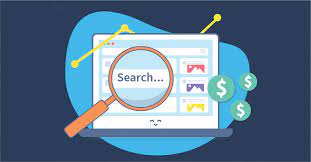PAID SEARCH MARKETING IS COMPLETELY DRIVEN BY GOOGLE: Paid search marketing is frequently referred to as PPC (pay-per-click)… One thing to keep in mind is that, while Google is the most well-known paid search platform, other paid search platforms, such as Bing, are also available.
PAID SEARCH MARKETING IS COMPLETELY DRIVEN BY GOOGLE
Have you ever heard the phrase “Google is entirely driving paid search marketing”? I’m sure I’ve heard it. In fact, I sometimes wonder whether it’s all part of a conspiracy. But, before we begin speculating, let us examine the facts.

Search engine marketing can take various forms, but the most common is pay-per-click advertising. While Google claims that paid search has no effect on organic efforts, I’m not convinced, especially since paid search can have some indirect effects on organic.
CLICK-SHARE
Because Google ads appear above organic content, paid search results receive a large number of clicks. You can offset a change in link share by having both sponsored and organic links. As a result, because organic results are deeper down the page, you might conclude that Google paid is dominating search, adding to the conspiracy – paid search marketing is fully driven by Google, and that’s where they want you.
Google has also enlarged text adverts, making paid advertisements stand out more in search results. There are now three headline fields, and two description fields and the display URL can include two path fields. Ads increased in size by 50% as a result of this adjustment, and the possibilities for new ad copy appear limitless. According to WordStream, advertisers’ click-through rates increased by 20% on average after making this change.
As Google’s algorithm continues to make it easier and faster for searchers to find information without leaving the SERP, there will be an even greater emphasis on payment by companies. With these types of developments, digital marketers will need to respond to changes in both organic and paid campaigns, thereby determining how the tactics may complement one another.
USER SIGNALS
With Google’s increased usage of artificial intelligence, search intent will be more crucial than ever for both paid and organic results. When targeting informative and transactional terms, paid and organic will need to collaborate in order to develop excellent content and rank at the top of search results. Because such individuals will return to your website after clicking on the advertising. Google will examine these user indications, such as bounce rate and time on page.
Inbound marketing is something that a competent digital marketer will implement into their organic search approach. This inbound strategy will need to account for ad clicks. This shift in paid search, I believe, will necessitate digital marketers to create advertising other than those for transactional search.
To be displayed to their audience, digital marketers will have to undertake both paid and organic marketing, similar to Facebook’s newsfeed algorithm. Facebook is a pay-to-play social media channel where those businesses can appear in the newsfeed. The likelihood of organic posts appearing is determined by the overall account and level of engagement, which is why businesses cannot simply run standard advertising.
The same may be said about Google search. Companies will need to develop new forms of advertisements to ensure that customers return to their website for more information on a specific issue. Digital marketers will need to be more strategic and innovative in their problem-solving skills.
How Paid Search Marketing Works
This is how paid search marketing works: businesses bid on certain keywords for which they want their advertising to appear. Paid search keyword planning is a science in and of itself, so for the time being, simply know that the more closely the keywords you select match a user’s query, the easier it is for your ad to rank highly.
Paid search advertising is displayed through an auction process. This determines which adverts appear and where they appear. There are several elements that influence where your ad will rank, ranging from the landing page (the page that the advertisement directs to) to the advertisement’s relevance to the searcher’s query, and more!
Why Do Paid Search Marketing? What Are the Benefits of Paid Search?
Why should you spend money on paid search marketing? Because 93 percent of online experiences begin with a search engine, and 63 percent of searchers click on paid advertisements. Why? According to 75% of those users, paid adverts make it easier to find the online content they want.

What are the additional advantages of paid search marketing? Consider the abbreviation “ETC.” Isn’t it simple? Paid search is defined as:
Efficient
Paid search advertisements might be a quick cure when a company has not engaged in search engine optimization (SEO) and does not appear in search results. Whereas SEO might take months to provide results, paid search ads allow your advertisements to appear on the first page immediately after they are created!
Targeted
You can choose which keywords your ad should appear for as well as how much you are ready to pay for each click. You can omit terms, target certain regions, and do a variety of other things!
Cost-Effective
You have complete control over your paid search budget and can track where it goes. Consider this: you may spend $1,500 on a billboard and not receive a single lead. People passing by may not require your product or service. Instead of spending $1,500 on a billboard, you might target people who are actively seeking your products and services online and allocate that $1,500 to people who are more likely to be qualified leads. Not only that, but businesses earn an average of $2 for every $1 spent on Google Ads.
Relevant Posts
- What is a scare package cold war?
- How many steps to hatch an egg bdsp
- What is a smart list on Facebook
- Paid search marketing is about bidding and buying relevant keywords

